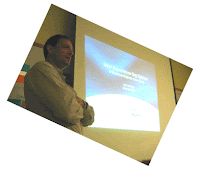 Listening to the great Bill Moyers tell Charlie Rose that "too many powerful interests have a stake in the dysfunction of government that they don't want to fix what is the fundamental structural problem" reminded me of some of the things John Armitage, Director of User Experience at Business Objects, emphasized when he appeared as a guest speaker during my "User Experience Managers and Executives Speak" course earlier this year.
Listening to the great Bill Moyers tell Charlie Rose that "too many powerful interests have a stake in the dysfunction of government that they don't want to fix what is the fundamental structural problem" reminded me of some of the things John Armitage, Director of User Experience at Business Objects, emphasized when he appeared as a guest speaker during my "User Experience Managers and Executives Speak" course earlier this year.
"There is only so much air in the room -- only so much budget, head-count, attention, and future potential in an organization. And people within the organization are struggling to acquire it -- struggling for power, influence, promotion, etc. whether because of ego or as a competitive move against threats of rivals. People will turn a blind eye to good ideas if they don't support their career and personal objectives. Hence, if user experience is perceived as a threat, and if they think they can stop it, they will, even if it hurts the company."Stating that it is management's responsibility to prevent this from happening, John cautioned that it is hard to build incentives and checks and balances to get organizations to "let user experience in," particularly where user experience is the new kid on the block (as it is in most companies). To get organizations to let user experience in, "you have to take power away from people who have it now."
John argued that you ultimately need to pose the following question to those who have the power now: "Is it better to have a small part of a bigger thing or a big part of a small thing?” Hence, in an engineering-dominated company, it is engineering that needs to be convinced that by giving up some headcount and influence to user experience personnel, the company will grow bigger than it otherwise would, and all will benefit.
John referred to a common obstacle to this: given that the importance of user experience isn’t a secret anymore, everyone -- engineering, marketing, even the president of the company -- might claim to be a user experience expert.
Does this describe how things are where you work? Are those in power unwilling to give up as much of their power as would be most beneficial to your company? What do you need to do in order to convince them to do so?
